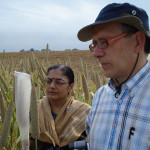In Bangladesh, 41 percent of children under five are estimated to be zinc deficient according to the Bangladesh Demography Survey, and the country loses over US$700 million in gross domestic product due to vitamin and mineral deficiencies according to the World Bank. Faced with such deficiencies in nutrition and productivity, HarvestPlus, in partnership with the European Commission and the IFPRI-led CGIAR Research Program on Agriculture for Nutrition and Health (A4NH), worked closely with the Bangladesh Rice Research Institute (BRRI), the International Rice Research Institute, and 30 other partners to develop three rice varieties fortified with zinc.
HarvestPlus India
MOTIVATION HarvestPlus, part of the CGIAR Research Program Agriculture for Nutrition and Health (A4NH), seeks to reduce hidden hunger—also known as micronutrient deficiencies—by breeding and deploying staple food crops that are rich in vitamins and minerals. It develops such crops through a process called biofortification and partners with public and private sector organizations to disseminate >> Read more
HarvestPlus China
Using innovative ways to fight this “hidden hunger,” HarvestPlus-China contributes to knowledge and technology transfers across research institutions and implementing agencies in both developed and developing countries.
HarvestPlus
Since 2004, HarvestPlus has been working to combat micronutrient malnutrition, also known as “hidden hunger,” which afflicts billions of people worldwide.


